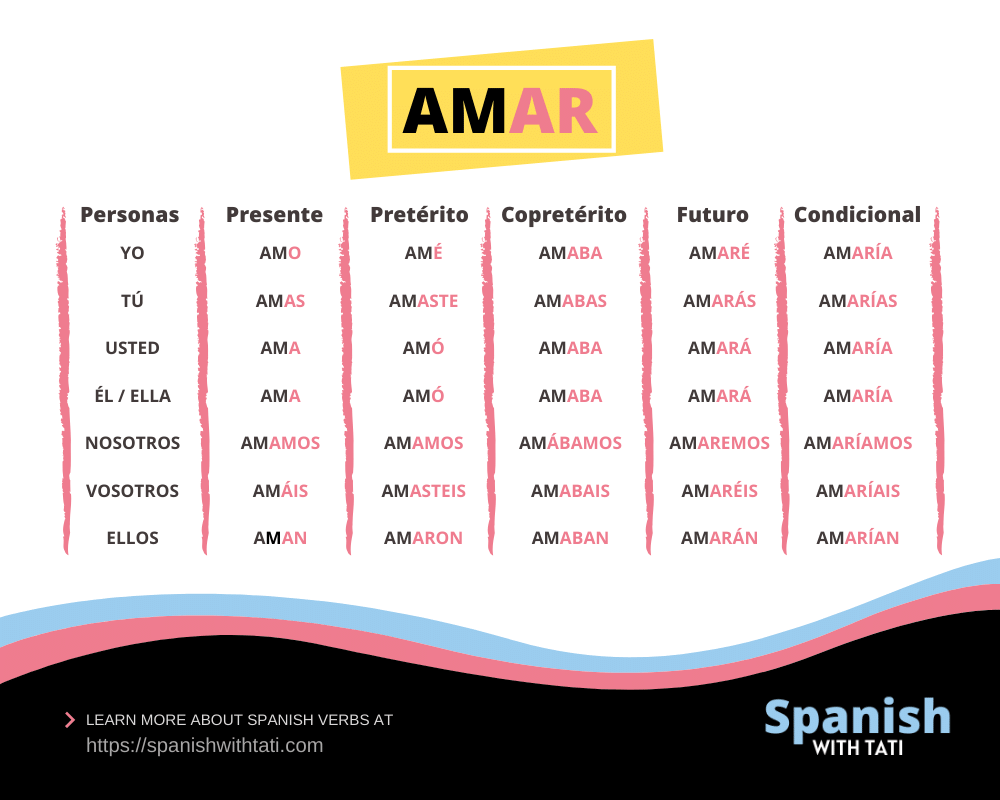
+1000 Spanish Verbs Regular and Irregular Spanish Verbs
The present tense forms for -ar ending verbs are pretty simple to understand. To conjugate, there are two easy steps. First, we look at the verb's infinitive form, which is the version with the -ar ending. For this, we remove that -ar ending. In step two, we add a different ending depending on the personal pronoun we want to use.

A very nice Free presentation on how to conjugate regular verbs in Spanish in the present tens
Be fluent in no time! Find the full list of all regular verbs underneath. Search, filter, scroll and find all the verbs you are looking for. Including English translation of the Spanish verbs. Click on the verb if you want to see it's full conjugation chart. Find a list of all 362 regular Spanish verbs here, including English translation.
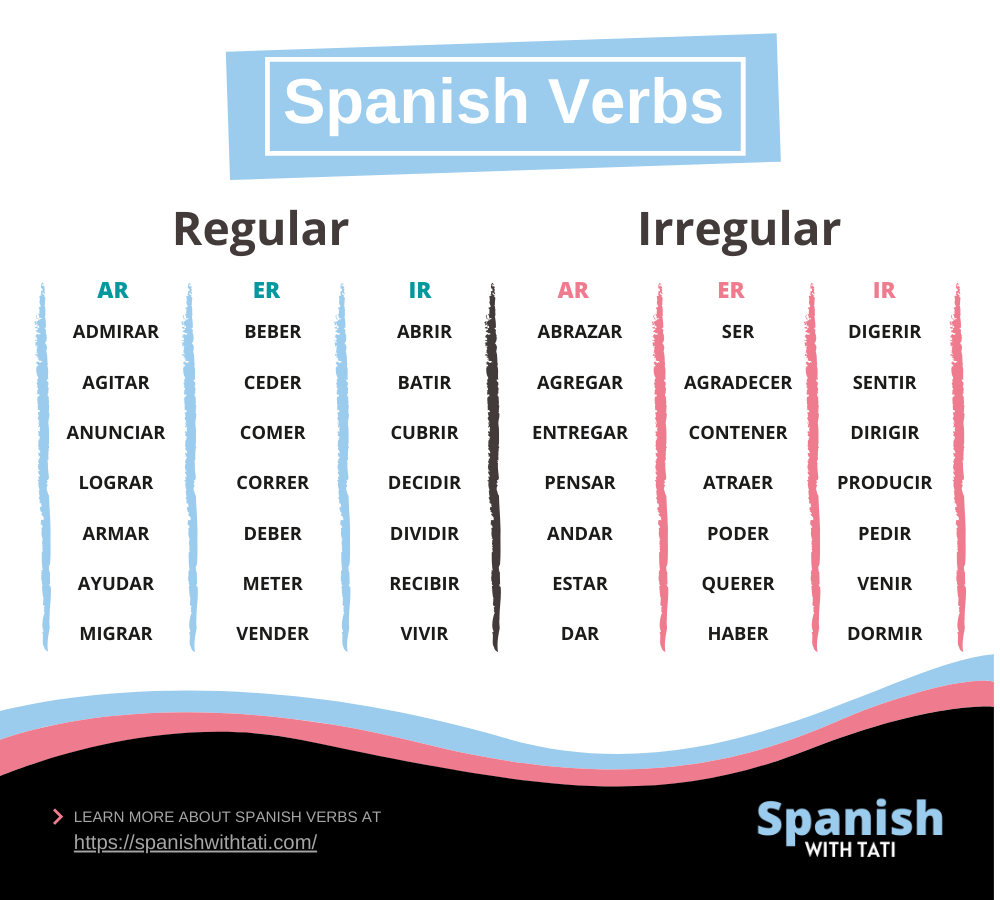
1000 Spanish Verbs Regular And Irregular Spanish Verbs All in one Photos
Regular Spanish Verb Endings and Tense Formations. Mastering the intricacies of Spanish regular verb endings and tense formations is vital for accurate and effective communication. This section delves into the specific endings for each group of regular verbs (-ar, -er, and -ir) and provides a comprehensive framework for learners to follow when.

A1 Level. Regular Verbs in Spanish
Regular Verbs in Spanish: Conjugation, List and Sentences Just like in English, there are rules for tenses and verbs in Spanish. The present tense itself has three major conjugation moods: the indicative, the subjunctive and the imperative mood.

Spanish lesson How to conjugate Spanish regular verbs • Spanish4Kiddos
Verbos regulares. The smallest category of regular Spanish verbs is those that end in -ir. To conjugate them, remove the infinitive ending and then add one of the following verb endings: Thus to conjugate abrir, you'll remove the infinitive ending to find the radical abr- and then add the appropriate endings:
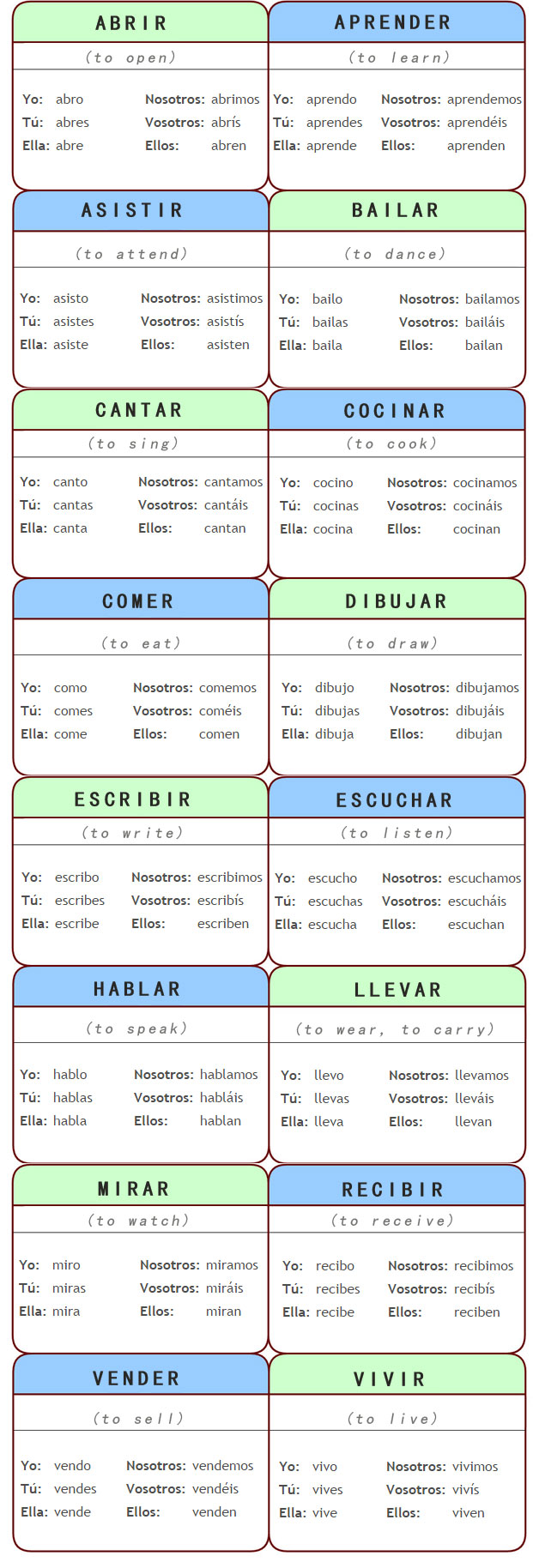
PRESENT TENSE regular verbs learn Spanish,tenses,grammar,spanish
Regular verb conjugation is central to mastering the Spanish language. By familiarizing yourself with the conjugation patterns for different pronouns, you will be well on your way to communicating confidently in Spanish. Unlocking Spanish Verb Conjugations: The Essentials of Regular Verbs

100 Common Spanish Verbs List [+ Free PDF]
35 Regular -AR Verbs in Spanish and How to Conjugate Them -AR verbs in Spanish are some of the most fun verbs to use! This list includes the most common -AR verbs you'll find in Spanish. You can begin to study their conjugations or start using them right away in their infinitive form.

EXAMPLES OF SPANISH REGULAR VERBS Spanish regular verbs, Spanish verbs, Spanish words for
What are regular verbs in Spanish? Spanish regular verbs are composed of two main parts: the root and the ending. The root is the part of the verb that expresses the meaning. The ending of the verb agrees with the number and person you are talking about. It also states the time and mood.
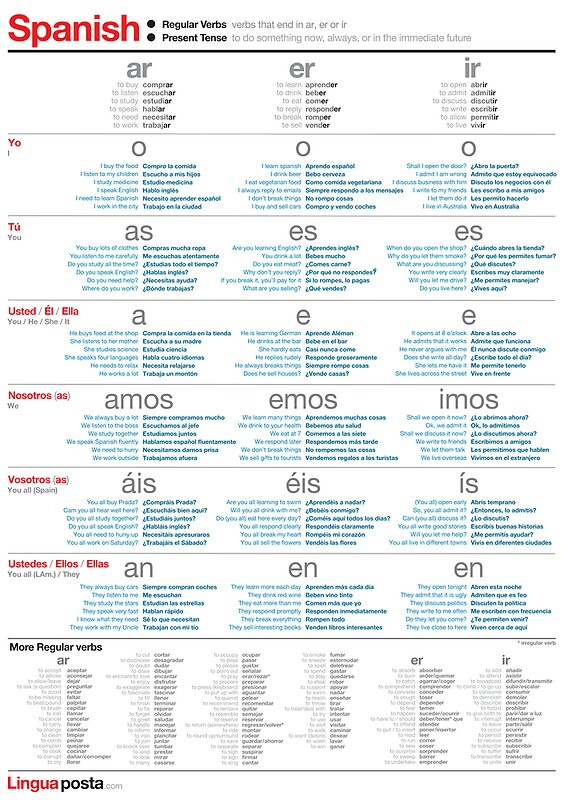
"Learn Spanish Regular verbs" Posters by linguaposta Redbubble
All Spanish verbs are either "regular" or "irregular." In this lesson we will look at three completely regular verbs: hablar (to speak) comer (to eat) vivir (to live) Notice the last two letters of each verb. habl ar (to speak) com er (to eat) viv ir (to live) There are three categories of verbs: -ar verbs (like hablar) -er verbs (like comer)

Spanish grammar The conjugation of regular verbs in the present tense Spanish courses in
To conjugate a verb in Spanish you drop the ending of the infinitive and add a new stem. Here are some examples. Drop the verb ending from the infinitive: Add a new ending to the stem: Hablar: drop the ar, leaving only the stem HABL. habl + o = hablo (I speak) Comer: drop the er, leaving only the stem COM. com + o = como (I eat) Vivir: drop the.
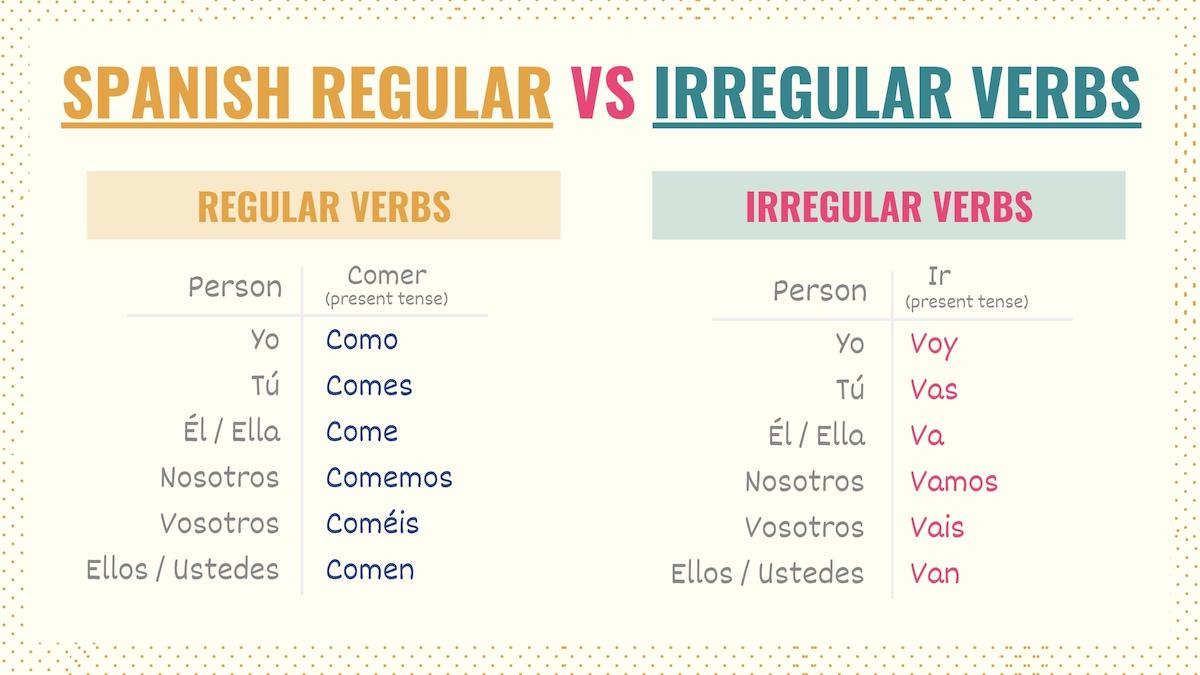
List of Spanish Verbs 85 Common Spanish Verbs + Tips
Spanish verbs are considered regular if their stem does not change when they are conjugated. Now, how can you use regular verbs in Spanish? You need to conjugate them. Let's learn more about it! Regular Verb Conjugation To understand how regular verbs in Spanish work, it is necessary to use something called "tenses."

Spanish Regular Verbs Worksheets (Verbos Regulares) Classful
1. What are regular verbs in Spanish? Regular verbs in Spanish are verbs that consistently follow the same pattern when conjugated. Spanish regular verbs consist of two main components: the root: represents the verb's meaning. the ending: shows the number, person, time, and mood. Let's take the word 'hablar' as an example!

Spanish Conjugation in the Present Tense Spanish verbs, Spanish teaching resources, Learning
Many Spanish verbs are completely regular, meaning that they follow a specific pattern of conjugation. In this lesson you will learn to conjugate regular -ar, -er, and -ir verbs (in the present tense). Before you can do that, you must memorize the following subject pronouns. yo (I) tú (you - informal) él (he)

Introduction to regular verbs in Spanish Casa Spanish
Practice your Spanish verb conjugations for the Present Tense (regular verbs only) with graded drill activities and fun multi-player games. Present Tense (regular Verbs Only). Created by CONJUGUEMOS. Charts & Printables . Verb Tense Reference Conjugation Chart Verb Practice Worksheet Crossword Flashcards (cut-out) Wordsearch.
Aprenda Español Regular Verbs in Spanish/ Verbos Regulares en Español
There are three categories of regular verbs: verbs ending in -ar, verbs ending in -er, and verbs ending in -ir. Here are the 50 most common regular verbs in Spanish, divided by category. Regular verbs ending in -ar This is the most common category. There are hundreds of verbs ending in -ar.
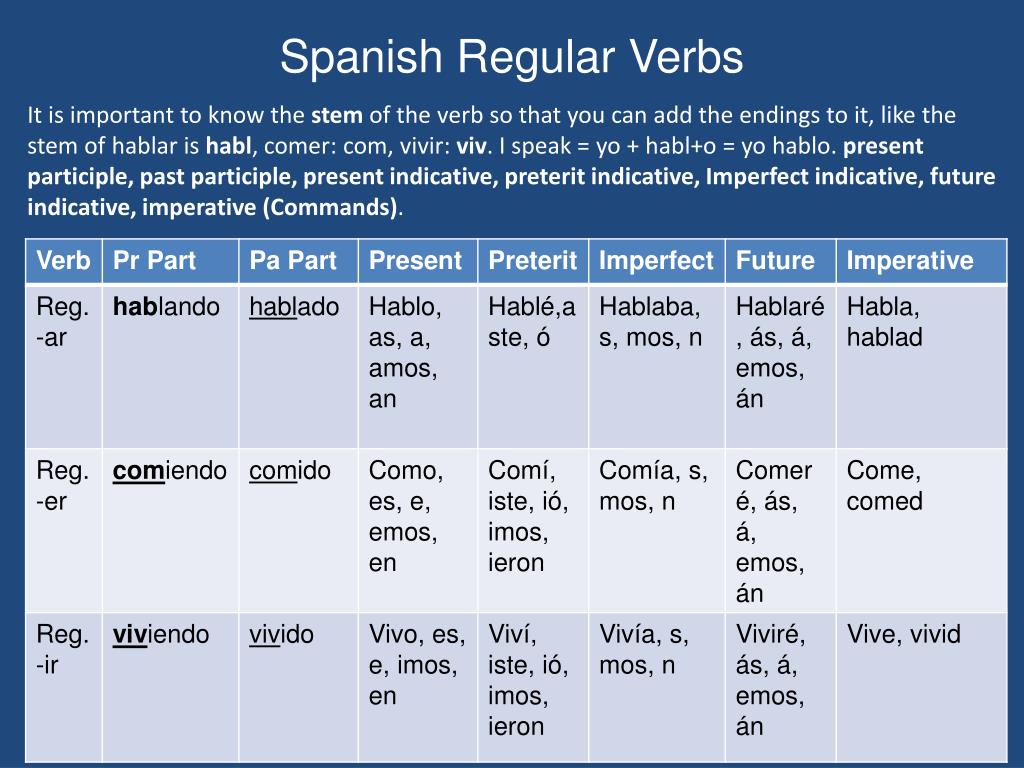
PPT Spanish Regular Verbs PowerPoint Presentation, free download ID6537399
What makes a Verb "Regular"? In Spanish, the infinitive form of a verb (regular or irregular) always ends in either -ar, -er or -ir (except for the reflexive verbs, which end in -se ). When it comes to conjugate a verb, that's when we can classify them as regular or irregular.